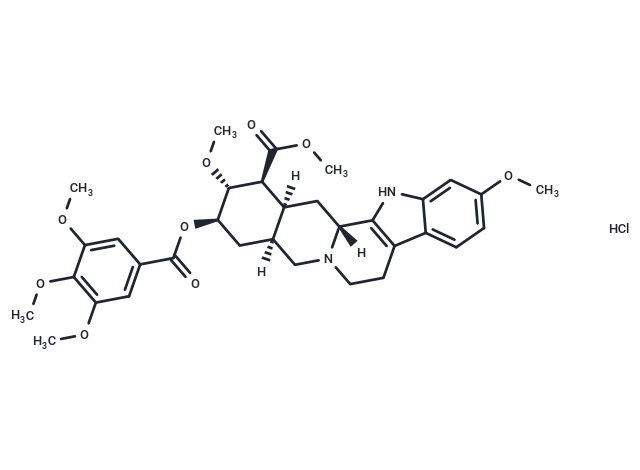Shopping Cart
Remove All Your shopping cart is currently empty
Your shopping cart is currently empty
Reserpine hydrochloride is the salt form of Reserpine and acts as an inhibitor of vesicular monoamine transporter 2 (VMAT2). It blocks the uptake of norepinephrine into storage vesicles, leading to the depletion of catecholamines and serotonin at central and peripheral nerve terminals. It has antihypertensive and antipsychotic properties and is commonly used to induce models of gastric ulcer and depression.

| Pack Size | Price | USA Warehouse | Global Warehouse | Quantity |
|---|---|---|---|---|
| 50 mg | $35 | - | In Stock | |
| 100 mg | $50 | - | In Stock | |
| 500 mg | $119 | - | In Stock | |
| 1 mL x 10 mM (in DMSO) | $39 | - | In Stock |
| Description | Reserpine hydrochloride is the salt form of Reserpine and acts as an inhibitor of vesicular monoamine transporter 2 (VMAT2). It blocks the uptake of norepinephrine into storage vesicles, leading to the depletion of catecholamines and serotonin at central and peripheral nerve terminals. It has antihypertensive and antipsychotic properties and is commonly used to induce models of gastric ulcer and depression. |
| In vitro | In JB6 P+ and HepG2-C8 cells, Reserpine hydrochloride (2.5–10 μM; 7 days) was used to evaluate its regulatory effects on oxidative stress and epigenetic markers. Reserpine hydrochloride upregulated Nrf2, HO-1, and NQO1 protein expression, while downregulating mRNA levels of DNMT1, DNMT3a, and DNMT3b. [1] In clinical isolates of Staphylococcus aureus, Reserpine hydrochloride (20 mg/L) was used to assess its ability to inhibit the NorA efflux pump, reduce the MIC of ciprofloxacin, and enhance its antibacterial efficacy. [1] |
| In vivo | In rats, Reserpine hydrochloride (0.2 mg/kg; i.p.; once daily for 14 days) was administered to induce a depression-like phenotype. 48 hours after withdrawal, reserpine significantly decreased immobility time and increased climbing behavior in the forced swim test, indicating adaptive changes in monoamine systems. [1] In rats, Reserpine hydrochloride (5 mg/kg; i.p.; single dose) was used to examine neurotransmitter turnover, which significantly increased urinary levels of vanillylmandelic acid (VMA) and 5-hydroxyindoleacetic acid (5-HIAA), indicating enhanced catecholamine and serotonin metabolism. [1] In rats, Reserpine hydrochloride (0.5–15 μg/kg; i.p.; single dose) was tested for its antihypertensive effect, which produced a dose-dependent reduction in blood pressure. [1] |
| Synonyms | Serpivite hydrochloride, Serpasil hydrochloride, Serpalan hydrochloride |
| Molecular Weight | 645.14 |
| Formula | C33H41ClN2O9 |
| Cas No. | 16994-56-2 |
| Smiles | C(OC)(=O)[C@H]1[C@]2(C[C@@]3(C4=C(C=5C(N4)=CC(OC)=CC5)CCN3C[C@]2(C[C@@H](OC(=O)C6=CC(OC)=C(OC)C(OC)=C6)[C@@H]1OC)[H])[H])[H].Cl |
| Relative Density. | no data available |
| Storage | keep away from direct sunlight | Powder: -20°C for 3 years | In solvent: -80°C for 1 year | Shipping with blue ice/Shipping at ambient temperature. | ||||||||||||||||||||||||||||||
| Solubility Information | H2O: < 1 mg/mL (insoluble) DMSO: 40 mg/mL (62 mM), Sonication is recommended. | ||||||||||||||||||||||||||||||
| In Vivo Formulation | 10% DMSO+40% PEG300+5% Tween 80+45% Saline: 2 mg/mL (3.1 mM), Sonication is recommended. Please add the solvents sequentially, clarifying the solution as much as possible before adding the next one. Dissolve by heating and/or sonication if necessary. Working solution is recommended to be prepared and used immediately. The formulation provided above is for reference purposes only. In vivo formulations may vary and should be modified based on specific experimental conditions. | ||||||||||||||||||||||||||||||
Solution Preparation Table | |||||||||||||||||||||||||||||||
DMSO
| |||||||||||||||||||||||||||||||
| Size | Quantity | Unit Price | Amount | Operation |
|---|

Copyright © 2015-2026 TargetMol Chemicals Inc. All Rights Reserved.